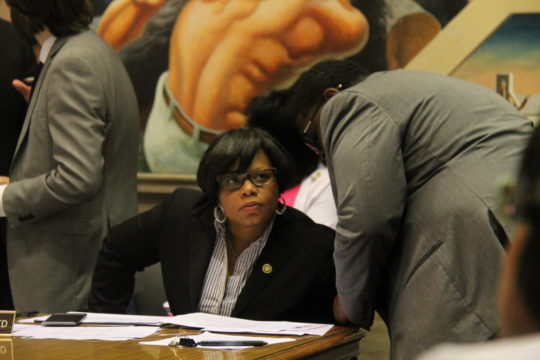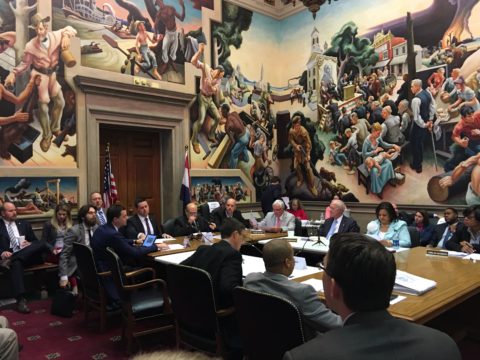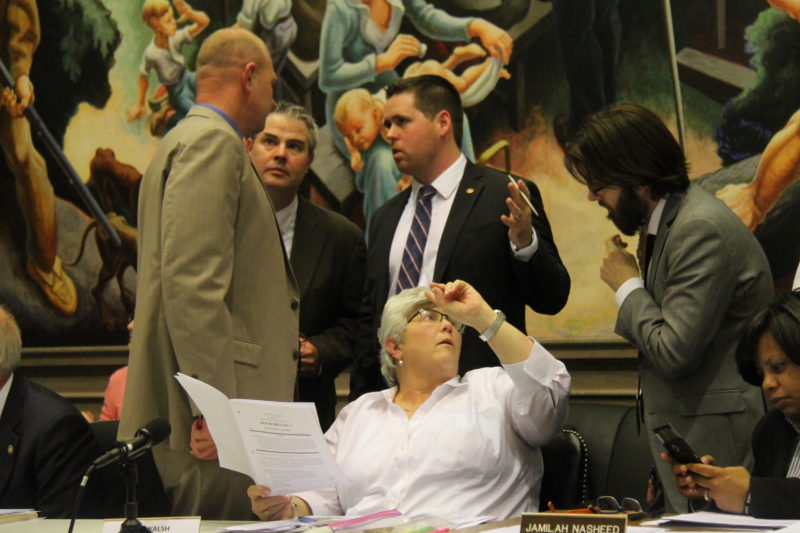JEFFERSON CITY, Mo. – It looks as if the Missouri legislature might be able to get the budget to the governor’s desk by the Friday evening deadline after all.
After rescheduling a meeting of the budget conference committees seven times, members of the House and Senate finally gathered in the House Lounge to get down to the business on the Show-Me State’s $27.8 billion budget.
Legislators worked for nearly six hours to find compromises, many of which were not met happily.
“It’s been a tough year,” Fitzpatrick said. “We’ve had to make a lot of cuts, and we’re going to do a lot of things that not everybody is going to love.”
On the higher education front, the committees agreed to lower cuts to the proposed House rate of 6.58 percent instead of 9 percent cut that Gov. Eric Greitens had recommended.
While the legislators lessened the proposed cuts to universities and colleges, sparks still flew when Sen. Jamilah Nasheed heard that the committee was declining to give $1 million to Harris-Stowe State University for graduate programs.

“It’s racist to me,” she said. “Historically black colleges are being treated unfairly here in Missouri.
“We may be going to a special session on this,” Nasheed finished.
One major issue of contention when the governor first released his budget proposal was the cuts to nursing home and in-home service aid.
Under the governor’s proposal, funding would be cut for anyone ranked under 27 on a scale for the level of care. Roughly 16,000 people would have lost eligibility with the raised thresholds.
The House sought to return the funding to with their version of the budget, but the Senate appropriations committee put the money in to fund those who would be considered eligible as a 24 or higher.
The committee reached a compromise for consumer directed services, settling at a level of care at 24 with money from general revenue and putting the money that had been pulled from the Missouri Senior Services Protection Fund back where it came. That proposal would still leave roughly 8,000 people without the services.
However, the compromise allows that number to increase to 21 once again if HCB 3, the circuit breaker repeal, is passed this session. That bill, however, remains stalled in the Senate and has until next Friday’s end of session.
Another item worthy of notice was the committee’s decision to side with the Senate’s position to fully fund Missouri State Employee Retirement System (MOSERS), the employee retirement system. The House had called for nearly $31.5 million less than the Senate.
However, the budget negotiators denied funding that would have allowed Highway Patrol members to move up the pay grid, They argued most other state employees would not receive raises, and it was only fair to treat everyone equally across the board.
The budget plan also cuts eight administrative law judges who oversee worker compensation cases at the Department of Labor and reduces inspectors for prevailing wage laws.
The committee also cleared language that makes sure no money can be used for tolling roads or DWI checkpoints.
The Attorney General’s Office nearly lost out on $6.85 million when no representative was present during the House Budget Committee’s hearing earlier in the year, but that was returned on the House floor – except for $850,000. The committee also returned that amount to the AG’s office on Wednesday night.

Recent turmoil inside the Senate pointed fingers at President Pro Ten Ron Richard for a $1 million appropriation to build a private airplane hangar in his district. Sen. Ryan Silvey had questioned Richard about the line item in the Senate’s budget, asking where it had come from. That item was removed from the compromised budget.
Another big moment came when the committee agreed to a compromise on Rep. Bruce Franks’ proposal to fund a summer jobs program in the amount of $4 million.
Sens. Dave Sater and Mike Cunningham both argued against the compromise, saying the funds could be better used to help people get jobs.
“With all due respect, I think this program pays great dividends,” Rep. Justin Alferman said, supporting the original House position of $6 million. “But we’re willing to compromise.”
For Fitzpatrick, it was a major accomplishment, finding ways to continue progressing the budget after getting a late start. More importantly, Fitzpatrick was able to deliver on his priority, the elimination of all “E’s” from the budget and replacing them with actual monetary figures.
The budget still needs final approval from the House and Senate, and state law requires it to be done before Friday, May 5 at 6 p.m.
“At the end of the day, this job always ends up resulting in a lot of friction between the House and the Senate, and it doesn’t matter which two people are involved,” Fitzpatrick said. “Sen. Brown and I got to a good place the other day, and have similar philosophies on how to balance the budget and save money. So hopefully we can get this thing out of the House tomorrow (Thursday) and over to the Senate and let them do their thing and hopefully get it done by Friday.”
Benjamin Peters was a reporter for The Missouri Times and Missouri Times Magazine and also produced the #MoLeg Podcast. He joined The Missouri Times in 2016 after working as a sports editor and TV news producer in mid-Missouri. Benjamin is a graduate of Missouri State University in Springfield.



